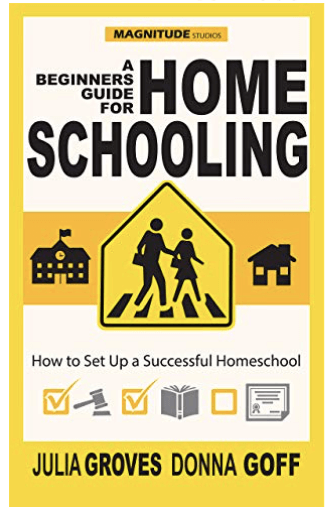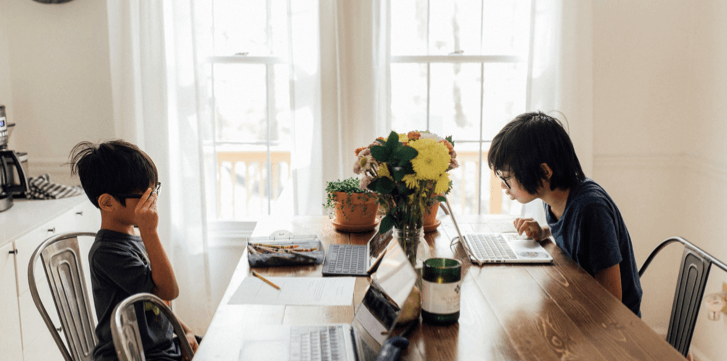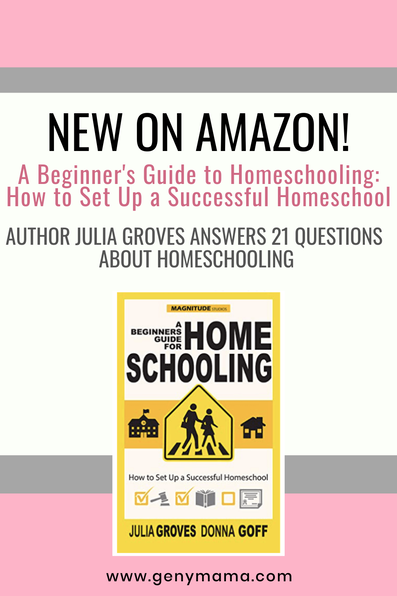|
Have you ever thought about homeschooling your child? Parents across the country are currently debating what course of schooling will be best for their children come the fall and many are considering homeschooling. Enter, Julia Groves. Julia, along with her mother, have written a book (the first of many) titled "A Beginners Guide for Homeschooling". Their aim is to help new homeschooling parents for success. I had the privilege to interview Julia and ask her, not only my questions about homeschooling but other mother's questions as well. To learn more about Julia's new book and to get some insight on what it means to be a homeschooling parent, read on! A Beginners Guide for Homeschooling: How to Set Up a Successful HomeschoolShe was homeschooled and she is currently homeschooling her three children, Julia Groves' knows a thing or two about homeschooling and now she has written a book about setting up a successful homeschool. A Beginner's Guide for Homeschooling is available on Amazon now! Julia Groves answers 21 questions about homeschooling: 1. Congratulations on the release of your first book! What made you decide to write a book?Julia: Thank you! I am really excited for our book and hope it helps many parents on their homeschool journey. As for what inspired us to write it...Even though I don’t talk about it all the time, my friends and followers know that I was homeschooled and that my husband and I homeschool our children. Because of this I have been contacted by a lot of people lately asking questions about homeschooling. After writing up a lengthy replay to yet another friend asking me for help about homeschooling I thought, “Why don’t I just write a book?" I mentioned the idea to my husband and he suggested I reach out to my mother Donna Goff to see if she would be interested in co authoring the book with me. His reasons were that while I have the background experience of having been homeschooled myself as well as currently homeschooling my children, my mother is an acknowledge homeschool expert. Not only did she homeschool most of her 7 children all the way through High School, but she created her own Homeschool curriculum. She has been invited to speak at several major homeschool conferences across the country and had privately mentored homeschool parents for the last couple decades. I presented the idea to my mother who readily agreed to co-write the book with me and here we are. 2. What was the biggest challenge in writing this book?Julia: I would have to say that the biggest challenge was deciding on how much information to put into this book. As you could imagine with all our experience we had a lot to say, but we didn’t want a huge overwhelming book about homeschooling. (there are a lot of those already out on the market) In the end we decided to write a whole series with this being book one. The other big challenge in writing this book was the technical side of formatting the book for publishing. I have never published a book before and the whole process has intimidated me for years and kept me from doing so. Now that we were finally going to do this I quickly learned that E-books are formatted differently than print books and required completely different programs. I ended up doing a lot of research and then spending hours figuring out how to do it all. I totally did a happy dance when the work was all done. "Not only did she homeschool most of her 7 children all the way through High School, but she created her own Homeschool curriculum. She has been invited to speak at several major homeschool conferences across the country and had privately mentored homeschool parents for the last couple decades." - Julia on why she decided to write "A Beginners Guide to Homeschooling" with her mother, Donna Goff 3. How long have you been homeschooling your children?Julia: My kids are 6, 8 & 10 so we have been homeschooling officially for 5 years. 4. Do you find it hard to get your kids to focus or listen to you during a lesson?Julia: Kids are kids and they all have their moments. However I have found that my kids focus better when we start first thing in the morning and get the harder subjects (that require direct parental supervision) out of the way first. If my kids are having a difficult day, (which honestly does happen from time to time) we take a step back and assess: Are our kids struggling with focusing because they are struggling with the subject, are hungry, have a case of the wiggles or have they reached their saturation point? When we determine the answer it is easier to know how to address the issue. I have found that regularly reading out loud to my kids books that they are interested in has helped train them to be more focused and respectful for study time. 5. Were you homeschooled? If so, did you enjoy it?Julia: So I briefly mention this in the introduction of our book, but my first unofficial experience with being homeschooled was when I was in kindergarten. My mother temporarily took both my older brother’s out of public school for the last few months of that school year and I often joined in on their lessons for fun. Officially, I was homeschooled from part way into my 6th grade year though High School. Did I enjoy it? Absolutely! The truth is, I actually begged to be homeschooled. I had skipped 4th grade while in public school and was getting bullied for being “too smart”. Additionally we had moved the summer between my 5th and 6th grade year and my new school was a year behind my old school. They spoke of skipping me another grade but I worried that it would make the bullying worse so I asked to just come home. I promised my mother if she let me I would do all the work and she wouldn’t have to lift a finger. I loved being able to study subjects I was interested in, to greater depths. I loved the freedom of having the world as my school, we would often spend time at the library, and museums. When I was 14 and my 16 year old brother was a freshman at the local university I used to go visit him and sit in on some of his classes with him (the professors never minded). Homeschool brought learning to life for me and helped me to gain a love of learning that has blessed me throughout my life. "Did I enjoy it? Absolutely! The truth is, I actually begged to be homeschooled." Recently, I asked for parents to submit their questions about homeschooling. Here are some of the questions I received:6. What type of person makes for a good homeschooler? (submitted by Liberty, B4 and Afters) Julia: Honestly, I hear all the time, “Wow it’s amazing that you can homeschool your kids, I could never do that.” The truth is that despite popular belief anyone can be a good homeschooler. I know that after experiencing the craziness of distance school last spring many parents were more convinced than ever that they could never homeschool their kids. But the truth is, homeschooling, really homeschooling is vastly different than distance schooling (aka school at home) In fact, in many ways homeschooling is a lot easier than you might think. Best of all, there is no homework so when you are done for the day you are done. Again, there will be good days and bad days but that is true for anything you do. If you are willing to adjust your thinking and stick with it, you will find that you have more good days than bad and that the experience can be well worth it for you and your children. 7. I've heard homeschooling can be quite expensive, how much does it actually cost? (submitted by Viktoria, Easy Activities for Kids) Julia: This is a very nuanced question. Truthfully homeschooling can cost as little or as much as you choose. We actually go into this in Chapter 3 of our book. Yes some curriculums can be quite expensive, as can some supplies. However, you can often find them on sale if you keep your eyes on them. Also there are sooo many inexpensive and even free curriculums and resources that are fantastic and even easier to use than many of those uber expensive ones. In our book we talk about ways to budget to make purchasing homeschool curriculums and resources more affordable. 8. How long do you spend homeschooling each day? (submitted by Crystal, Simply Full of Delight) Julia: Right now about 3-4 hours a day. We try to have our core Homeschooling done by lunchtime. Though after lunch my older kids will often enjoy some educational games (like Adventure Academy that they play online with their cousins) or do some self directed studies on topics of interest. Honestly it doesn’t take as long to do homeschool as public school each day because we cut out all the busy work and just get down to learning. There are studies that show that even if you were using the exact same curriculum as the public school you could complete the days work in less than 2 hours at home. Just some food for thought. As your kids get older their school days will get longer but this also correlates to more time in individual study time. "I know that after experiencing the craziness of distance school last spring many parents were more convinced than ever that they could never homeschool their kids. But the truth is, homeschooling, really homeschooling is vastly different than distance schooling (aka school at home)" 9. Which curriculum should I use? (submitted by Tiffany, Saving Talents) Julia: This is also a very nuanced question that we have a whole chapter dedicated to in our book. While we don’t tell you what curriculum to buy we do show you how to find if a curriculum will be a good fit for your family and we have another chapter with our personal recommendations for curriculums, websites, apps, books and resources. The truth is, there are a lot of good curriculums out there that you will find people swear by. However, what works for one person may not work for another. Before you go out and potentially spend a lot of money on any specific curriculum it is important to assess where you are (and if you have any special needs) then decided on the education model, method and principle that most resonate with you. We walk you through this in our book. Knowing the answers to these questions will not only help you find the right curriculum to use, but will help you know how to apply whatever curriculum you choose so that it can best meet the needs of your family. 10. Here are a few Curriculums’ and Resources I personally recommend. (we have a lot more listed in Chapter 8 of our book) Julia: If you are looking for an easy to use homeschool curriculum I highly recommend checking out my mother’s Power of an Hour curriculum. It is a grab and go curriculum that you use together with your classic reading and scripture study for a full classical education. https://mentoringourown.com/power-of-an-hour-overview/ For teaching your Children to Read my favorite curriculum has been Learning Dynamics. It is an easy to use developmentally designed reading program that kids enjoy (and even beg for.) With it you will have your kids reading books in just 4 weeks with easy 10 minute lessons every other day. I have used it with all my kids and did a review on it and have a coupon code on my blog https://thequietgrove.com/teaching-your-kids-to-read-with-learning-dynamics/ For math I have really enjoyed Khan Academy (it’s a free educational website) with my kids. Their free courses are divided by grade level and for each concept they have a series of videos to talk your children through understanding the concept followed by a practice test to see how well they understand what was taught in the video followed by an actual test. We have also enjoyed Khan Academy’s Programming and Creative Writing Course. https://www.khanacademy.org/ "Before you go out and potentially spend a lot of money on any specific curriculum it is important to assess where you are (and if you have any special needs) then decided on the education model, method and principle that most resonate with you. We walk you through this in our book." 11. Any recommendations for supplemental activities? Thoughts on paid resources vs. free printables? (submitted by Cendu, CenduParam.com) Julia: We do some of both. Most of our supplemental activities that we enjoy are free but there are a few we have paid for and enjoy. I don’t like doing too much busy work so I keep worksheets to a minimum. There are some great ones available online. I created some worksheets that I used for US Geography that I have on my site for free and I have found other great printables for writing and math via Pinterest. There are also a bunch of fun experiments, crafts and learning activities you can do inexpensively with your kids that you can find on pinterest. Just search “Homeschool Experiments” “Homeschool Activities” “Homeschool Free Printables” We have used ABC mouse and Adventure academy for our kids. The games/activities are all educational and reinforce what the kids are learning in a fun engaging way. While these do cost you can often find their subscriptions on sale. https://www.abcmouse.com/ & https://www.adventureacademy.com/ We have also invested in memberships to local museums over the years as well as some good Subscription boxes. (My favorite of which was Kiwico https://www.kiwico.com/ they have different subscription boxes available for different aged kids) Related: Free Learning Resources for Kids and Parents 12. What are some tips for homeschooling when having a set schedule is next to impossible? (submitted by Taylor, Taylor's Treasures) Julia: I would recommend that you structure time not content. Let me explain. At traditional schools and in many homeschool curriculums you are expected/required to cover a certain amount of content every day. This does not allow for much flexibility or deviation from the structured plan. Because of this teachers/parents have strict schedules. However, most kids do not thrive in such an environment. They get frustrated and burned out feeling as if they are always behind. When this happens homeschooling becomes a tug of war with reluctant students and overwhelmed parents. Instead, I would recommend scheduling blocks of time for any given subject that you can rearrange and fit into your day however works best for you. For example: we have a set amount of time blocks we set aside each day for certain subjects like math, reading, writing etc and we get done what we get done within those time blocks. Education is not a race where you have to check off having learned a certain amount by a certain time. When you let kids learn at their own pace they are less likely to get burned out. Also by scheduling time blocks (ie we today we will do xx minutes of math, xx minutes of reading, xx minutes of writing…) you can make your actual schedule flexible and fluid to meet your needs. 13. How do you schedule homeschooling during a work day when you are also working? (submitted by Julie, Fab Working Mom Life) Julia: So both my husband and I work from home and homeschool our 3 kids. It is a balance act but very doable. First, realize that if your kids are young, it’s better for their learning and retention to keep your day shorter and have more time to learn and develop through free time play. If your children are older, only a portion of their homeschool day needs to be overseen by an adult. The older your children the more they do self directed studies and then return and report. Secondly we have found that having a schedule helps. My husband is a morning person and gets his best work done first thing in the morning. I on the other hand am a night person who gets their best work done in the evening. For us we found that if my husband goes to bed at a good time and wakes up early in the morning he can get a decent amount of work in each morning before the kids get up to start their day. While some homeschool parents let their kids sleep in, we have found that what works best for us is to get our kids up by 7, dressed and fed and homeschool starts at 8am. We do the subjects that we have found require more oversight first like math. Then we move on to the subjects that the kids are able to do more on their own and report to us when done (like reading, writing, typing, watching documentaries…) while we work nearby. Our main homeschool day is done by lunch after which some days the older kids often play some educational games or do full self directed extracurricular studies and other days they play) This is when my husband and I really get down to our work (being available if needed) Our evening routine is where I do our family reading right before bed. Then, after everyone is asleep at night I get in my uninterrupted work time in. Lastly, at the beginning of last year we gave the kids the option of studying xx time M-F or to have slightly longer days M-Th with Friday off. They chose that option and we have found it works great for us. The kids like having shorter school weeks (just reading on Friday) and we managed to get more work done. "Our main homeschool day is done by lunch after which some days the older kids often play some educational games or do full self directed extracurricular studies and other days they play" 14. How do you teach multiple children on all different grade levels when homeschooling? (submitted by Christina, Troubleshooting Motherhood) Julia: This is actually one of the questions we are addressing in our next book. First this question leads back to what homeschool model you adhere to. (The Age Grade Based Model, The Non Graded Mastery Model, & the Self Directed Unschooling Model) For our family we believe practice the Non Graded mastery model of education. While I am aware of what grade my children would be if they were attending Public School we don’t use grades in our homeschool. When you throw grades out and focus on where your children are as far as understanding and mastery you would be surprised at how close some of your kids actually are on various subjects despite being in different grades. In our home we do a sort of one school one room school approach. Many subjects we do with all our kids together at the same time. Then we break out in individual study blocks. (like math, Reading, & typing/writing) where we work on our kids according to their mastery level. Some individual studies require my help (like math) where others the kids can do on their own with assignments (like writing/typing) Then we like to end our school day with a documentary the kids all watch together then return and report what they learned and we have a group discussion on it. As your kids get older their school day will get longer and more time will be spent in individual studies. 15. How do you make homeschooling fun? (submitted by Audrey, Two Pink Peonies) Julia: My kids definitely learn better (and retain more when they are having fun) While not every subject or assignment is fun and exciting for all the kids we try to switch things up so they stay engaged. If a subject or an assignment is difficult we tend to keep the time we work on it shorter or switch it up with a fun activity. For instance when studying math we do a combination of math online with Kahn academy, and math activities (like Multiplication War) My kids enjoy it when I can do hands on activities to supplement what we are learning. worksheets, experiments and occasionally crafts, coloring pages or recipes. We LOVE doing trips to the library, local museums and historical sites. We enjoy watching documentaries and discussing what we learned at the end of the school day (history, science, geography…) And most importantly other than the core subjects that we study at our children’s own pace, a lot of what they study is interest based. If the kids are interested in a subject they are more likely to enjoy learning about it. Related: Free Math Games for Kids Online 16. How do you socialize your kids when homeschooling? (submitted by Natasha, The Artisan Life) Julia: This is another subject that we have an entire chapter dedicated to in our book. As a short answer to this question; in addition to getting together with their cousins (who are my kid’s best friends) and video calling friends who live far away, we encourage our kids to make friends with and play with kids in our neighborhood. Additionally, we also set up opportunities for our kids to meet up with other homeschool kids. This homeschool community has grown soo much over the last 2 decades that most states have a thriving homeschool community that you can do activities, meet ups and field trips with. In our book we discuss how to find these communities and ideas for different kinds of activities you can do to encourage a healthy social life with your kids while homeschooling. 17. Will homeschooling affect my child's social development? (submitted by Surabhi, The Smile On) Julia: We also go into this in our book. The truth is that most people don’t even know that I was homeschooled or that my kids are being homeschooled unless the topic comes up and we volunteer the information. HERE IS AN EXCERPT FROM CHAPTER 5 (HOW TO ADDRESS SOCIALIZATION NEEDS) IN OUR BOOK “There is a huge stigma of homeschool kids being socially awkward and inept. This is why the first question most people ask when they discuss homeschooling is, “But what about the socialization?” 18. Just a few final questions for you Julia. In your opinion, what is the biggest misconception about homeschooling?There are a lot of misconceptions that surround homeschooling. It is hard to narrow it down to just one. (Which is why this is the subject of our 3rd book) Here are a few of the big misconceptions I face all the time when people find out I homeschool:
"This homeschool community has grown soo much over the last 2 decades that most states have a thriving homeschool community that you can do activities, meet ups and field trips with. In our book we discuss how to find these communities and ideas for different kinds of activities you can do to encourage a healthy social life with your kids while homeschooling." 19. What has been your biggest challenge while homeschooling?Both my husband and I work from home full times (we own our own business) as well as homeschool our 3 kids. Though it is possible doing this isn’t always easy and takes some balancing and scheduling but we manage it pretty well. 20. Any advice for parents who may be struggling with deciding on whether or not to send their kids to in-person school this fall?We are living in crazy times. I know this isn’t an easy choice to make. So whatever you decide, no judgments. You know what is best for you and your kids. For those who decide to send your kids to in-person school this fall, start preparing your kids now so they are used to sanitizing their hands and surfaces regularly and wearing masks for long periods of time (that is a big one) Also, have a backup plan for if schools close down again. Personally I would advise that now is the perfect time to just transition to homeschooling your kids. Homeschooling can be an amazing gift to your family. Yes, there will be hard moments but that is true for anything of value. Homeschooling gives you the opportunity to be involved in your children’s education in a way not possible when you send them to school away from home. It also offers you freedom. You can travel when you want and school wherever you are. You can study what you want how you want. You can utilize the world as your classroom (with libraries, colleges/universities, museums, festivals, historical sites and more.) You can help make sure your children are instilled with a real love of learning that will carry them through their live. If you are feeling pulled to homeschool your kids, but are afraid to try, I would encourage you to just go for it. You can do this mama! 21. Any plans to write a second book?Yes we are actually working on a lot. This book is actually Book 1 in a Homeschooling Basics Series we my mother and I are writing. We are working on Book 2 right now and hope to have it out the beginning of August. Here are the working titles for the rest of this series:
I will also be doing a Understanding the Classics Series with my mother where we will extensively annotating our favorite classics (Annotations including definitions for words, idioms and phrases not common today, insights to the author, book settings, and references in the books, as well as contextual insights) Additionally We will include in each book a section with questions to ask to apply the book, and activities/recipes that tie in with the book. We hope these versions of some of our favorite classics will help readers to enjoy and better understand the works. Additionally, both my mother and I have a bunch of other books we are working on individually in addition to running our own websites.  Julia Groves is the co-author behind "A Beginners Guide for Homeschooling: How to Set Up a Successful Homeschool" She is also an extremely successful lifestyle blogger, you can find her at The Quiet Grove Be sure to follow Julia on the following social channels: Instagram, Facebook and Pinterest
4 Comments
I have been really trying to decide if homeschooling is for us. I want to, but I think I just really doubt myself. I appreciated this information. Gave me some food for thought. I think I might have to just jump in with two feet and see how it goes. Like you said, it's the perfect time!
Reply
I have been decided on homeschooling my children since before any of them were born. My oldest is only 4, and in our state we don't haveee to start until he is age 6. However, I want to get my feet wet and start getting an idea of what it will be like earlier rather than later. This is such a great resource with great questions and insight. Thank you so much sharing and to the author, Julia for sharing her wisdom and experience with us!
Reply
Your comment will be posted after it is approved.
Leave a Reply. |






 RSS Feed
RSS Feed